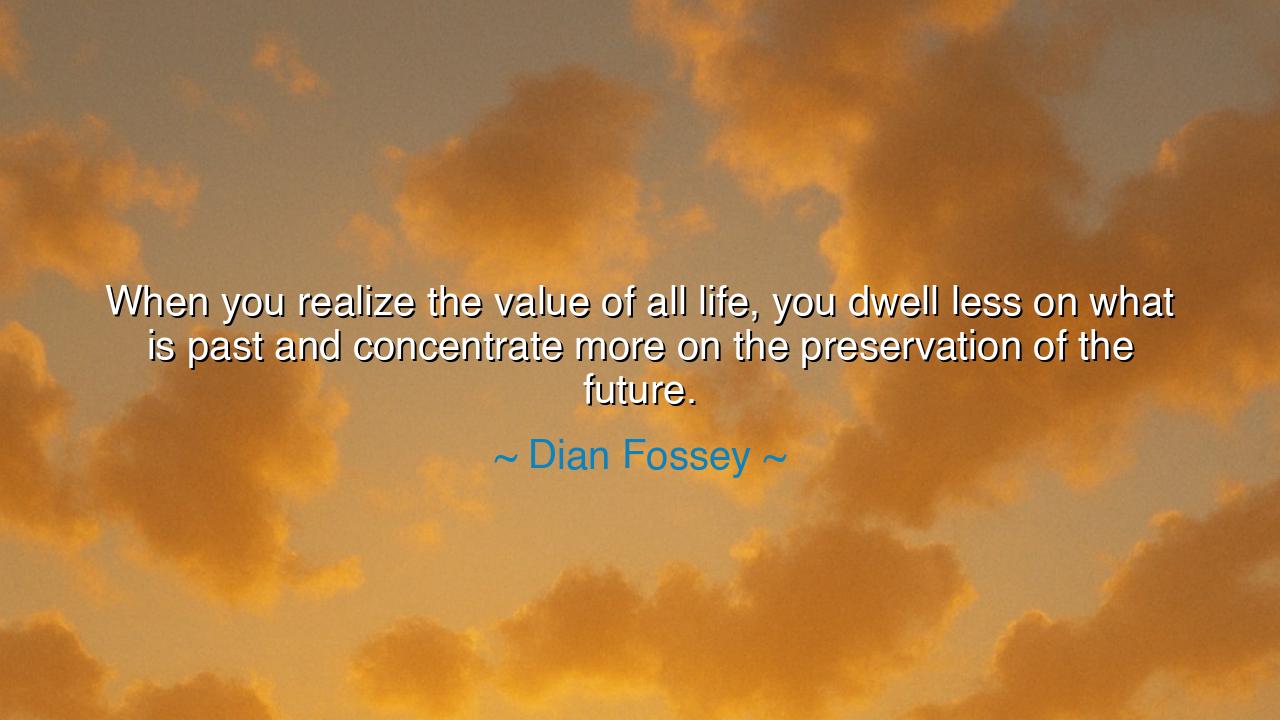
When you realize the value of all life, you dwell less on what is
When you realize the value of all life, you dwell less on what is past and concentrate more on the preservation of the future.






"When you realize the value of all life, you dwell less on what is past and concentrate more on the preservation of the future." These words from Dian Fossey, a passionate primatologist, hold a profound truth about life, value, and legacy. Fossey, whose work with mountain gorillas changed the course of animal conservation, emphasizes the importance of recognizing the sanctity of life in all its forms. Once we come to understand the fragility and value of life, she suggests, we are no longer weighed down by the regrets of the past. Instead, we shift our focus toward preserving and protecting what lies ahead. The future, for Fossey, is not just a continuation of the present, but a sacred responsibility—one that requires our conscious effort to nurture and safeguard.
This concept of valuing life and turning away from the past is not a new one. The ancient Greeks understood the cyclical nature of life and death, believing that life was to be embraced fully, without the burden of regret or longing for what was lost. Heraclitus, the philosopher of change, famously said, "No man ever steps in the same river twice," reminding us that the past is fluid and forever changing. What matters is how we move forward, and how we choose to shape the future, much like Fossey’s focus on the preservation of the gorillas and the ecosystems they inhabit. Her dedication to these creatures echoes the timeless understanding that our responsibility lies in protecting the future, not in lamenting the past.
The Romans had a similar ethos, expressed in their concept of virtus—the notion of moral excellence and courage in the face of adversity. The great statesman Cicero often wrote about the importance of acting for the common good and focusing on the future of Rome, rather than the failures of its past. Cicero’s philosophy was not one of looking backward to historical glory but of ensuring that the future of the state was secure through the actions of the present generation. Like Fossey, he recognized that the preservation of life—whether human or animal—was paramount to ensuring a meaningful and sustainable future.
Fossey’s work with mountain gorillas is a living example of this philosophy in action. In the 1960s, the mountain gorilla population was on the brink of extinction due to poaching and habitat destruction. Fossey did not allow the tragic past of the species to paralyze her with despair. Instead, she focused on the present and the future, dedicating her life to protecting these incredible creatures. Her approach was one of immersing herself in their world, earning their trust, and promoting conservation efforts that ultimately led to a significant recovery in their population. Fossey's focus on the preservation of life—without dwelling on past losses—serves as a powerful example of how the recognition of life's value compels us to act, not for the past, but for the future.
Consider also the example of Nelson Mandela, who, after spending 27 years in prison, chose not to dwell on the injustices of the past, but instead focused on the future of South Africa. Upon his release, he sought reconciliation rather than retribution, knowing that the future of his people depended on the unity and peace that could be achieved, not by resurrecting past grievances, but by fostering a shared vision for the future. Mandela’s choice to embrace a future focused on peace and freedom—rather than bitterness over the past—changed the course of history and showed the world that focusing on what is ahead can create a more just and sustainable society.
The lesson from Fossey’s words is one of empowerment. By recognizing the value of all life, we are called to move beyond the past’s burdens and focus on what we can build for the future. Whether it is through conservation, justice, or personal growth, we have a responsibility to nurture the world we will leave behind. The future is not an inevitable force that happens to us, but something that we create through our actions today. Fossey’s commitment to protecting the gorillas was not just a matter of preserving a species but of ensuring that the world we leave behind is one that values life in all its forms. Just as she dedicated herself to a cause greater than her own, we must all consider how we, too, can contribute to a better future for the generations that will follow.
In our own lives, we must embrace the wisdom of Dian Fossey and the ancients who understood that true fulfillment comes not from lamenting what has been lost, but from taking action in the present to shape a better future. Whether we are working toward environmental conservation, social justice, or personal growth, let us dedicate ourselves to the preservation of life, to ensuring that the world we leave behind is one of hope, sustainability, and compassion. The future is in our hands, and it is up to us to build it with wisdom, care, and an unwavering commitment to the value of life.






AAdministratorAdministrator
Welcome, honored guests. Please leave a comment, we will respond soon